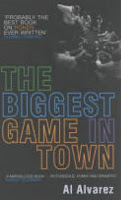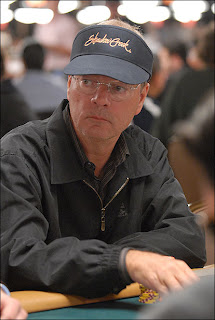Rereading The Biggest Game in Town: Losing (3 of 6)
 Returning to chapter 3 of The Biggest Game in Town by Al Alvarez, I wanted to say a few words about something Bobby Baldwin tells the author regarding what it takes to survive amid the high-stakes games frequented by him and some of the others to whom the author speaks.
Returning to chapter 3 of The Biggest Game in Town by Al Alvarez, I wanted to say a few words about something Bobby Baldwin tells the author regarding what it takes to survive amid the high-stakes games frequented by him and some of the others to whom the author speaks.Baldwin won the WSOP Main Event in 1978 at the young age of 28, at the time the youngest-ever to win the big one. That record would be broken in 1980 when the then 26-year-old Stuey “The Kid” Ungar won his first title. (Phil Hellmuth in 1989 would break Ungar’s record, to be broken again later by Peter Eastgate in 2008 and Joe Cada in 2009.)
By 1981 Baldwin had won all four of his WSOP bracelets as well as a great deal of respect from his fellow players. He would soon become a consultant for the Golden Nugget, then later would hold executive positions at the Mirage, the Bellagio, and eventually the City Center project. That small room in the center of the Bellagio poker room that has been home to many high-stakes games during the last decade -- “Bobby's Room” -- is named for Baldwin.
 That path Baldwin took from the world of high-stakes gambling and poker and into business probably suggests something of his personality and/or acumen. He continues to play poker and participate in the WSOP from time to time. I’ve seen him in a few events I’ve covered over recent years, such as the 2009 WSOP ME during which that photo was taken by FlipChip. But while he still can be found at the tables, over the years Baldwin has obviously found himself a more secure (or fitting) place behind the scenes in Vegas.
That path Baldwin took from the world of high-stakes gambling and poker and into business probably suggests something of his personality and/or acumen. He continues to play poker and participate in the WSOP from time to time. I’ve seen him in a few events I’ve covered over recent years, such as the 2009 WSOP ME during which that photo was taken by FlipChip. But while he still can be found at the tables, over the years Baldwin has obviously found himself a more secure (or fitting) place behind the scenes in Vegas.Back in 1981, though, when Alvarez spoke with him, Baldwin was still one of that core group of top poker pros whose brains the author was looking to pick in order to understand the “different ordering of reality” they seem to acknowledge (discussed last post).
Baldwin explains to Alvarez that in order to survive in the high-stakes games, it is necessary to possess “that intangible quality we call heart.” Confirming something David Mamet writes in “The Things Poker Teaches” (also from the early 1980s), Baldwin describes poker as a “character builder,” insisting that especially in the big games, “the mark of a top player is not how much he wins when he is winning but how he handles his losses.”
“You have to be able to live with adversity,” he adds, implying that adversity should be expected in the context of these games. Indeed, the act of taking a seat at the table means one is willingly inviting adversity into one’s life -- something every player should understand fully before sitting down.
Again, we’ve heard a lot of this before about how the best players are best at handling losing and accepting losing as a necessary part of the game. However, there was one statement by Baldwin that kind of stood out for me when rereading this passage again, something that struck me as perhaps further underscoring the profound difference between the top performers and the rest of us.
“I’ve lost several hundred thousand in one evening,” confesses Baldwin. “But I didn’t go up to my room and shoot myself; instead, I went to bed and slept like a baby.” He goes on to make the joke about other players also losing and sleeping like babies -- that is, “they sleep an hour and cry an hour, sleep an hour and cry an hour.” But Baldwin is saying he sleeps well. No crying. No worries.
“I myself find it easier to sleep when I lose than when I win,” he says. “That may sound odd, but it’s true. I think the reason is that when I have an extremely bad night I go to bed and escape from it in sleep. But when I’ve won I’m all pumped up and excited; I can’t unwind as quickly as I can when I’m down and semidepressed.”
A curious statement, I think, although I’ll admit I probably find it curious because I have so much difficulty identifying with it. I’m tempted to say that the statement indicates something significantly wrong -- that it somehow seems unhealthy to be able to “escape” so easily from being “down and semidepressed” into tranquil, untroubled sleep, as if doing so represents a failure to accept the “reality” of losing.
But then I remember the “different ordering of reality” acknowledged and experienced by Baldwin and his colleagues, thus making me less ready to deliver such a judgment.
While I imagine not a single reader of this blog will ever have experienced swings as large as Baldwin is describing, we’ve all won or lost amounts which are relatively significant to us, I’m guessing. And we’ve all been affected emotionally by those wins and losses.
What has been your experience? Do you sleep better after a big win or after a big loss?
Labels: *by the book, Al Alvarez, Bobby Baldwin, The Biggest Game in Town














1 Comments:
Playing Omaha, I'm still trying to figure out what a "big win" and "big loss" are.
I've won 20+ buy-ins in a night and I've lost over 10. But try to stay even-keel about both.
Post a Comment
<< Home